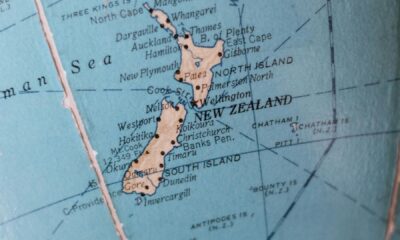Top Stories
Expert Explains Implications of Palestinian State Recognition

As New Zealand prepares to announce its position on the recognition of Palestine as a state, discussions are intensifying about the implications of such a move. This comes after Canada, the United Kingdom, and Australia have formally acknowledged an independent Palestinian state. Dr. Anas Iqtait, a lecturer at the Australian National University, provided insight into what this recognition entails.
Understanding the Concept of a Palestinian State
Dr. Iqtait emphasizes that recognizing Palestine as a state is largely a symbolic gesture. He explains that this recognition refers to a hypothetical state that would encompass the West Bank, Jerusalem, and the Gaza Strip. “This symbolic nature is really related to this reality, rather than the other point – which is, there isn’t currently sovereignty on the ground; it’s a hypothetical state,” Dr. Iqtait noted.
The statement highlights the complexities surrounding the issue of statehood. While several countries have taken formal steps to recognize Palestine, the on-the-ground reality remains nuanced and complicated. No sovereign authority currently governs the territories in question, raising questions about the practical implications of such recognition.
International Context and Upcoming Decisions
Winston Peters, New Zealand’s Foreign Minister, is currently in New York for the United Nations General Assembly. He is expected to reveal New Zealand’s stance on this matter later this week. The international community is watching closely as countries navigate their positions regarding Palestinian statehood, particularly in light of ongoing tensions in the region.
With the recognition of a Palestinian state by various nations, the conversation is shifting towards what this means for future negotiations and peace efforts. Dr. Iqtait’s insights underscore the importance of understanding the symbolic nature of recognition as opposed to the practical realities faced by Palestinians today.
As countries continue to reevaluate their relationships with Palestine and Israel, the implications of such decisions will undoubtedly impact diplomatic relations and peace processes in the Middle East. The outcome of New Zealand’s announcement may further influence global perspectives on this long-standing conflict.
-

 Sports2 months ago
Sports2 months agoNetball New Zealand Stands Down Dame Noeline Taurua for Series
-

 Entertainment2 months ago
Entertainment2 months agoTributes Pour In for Lachlan Rofe, Reality Star, Dead at 47
-

 Entertainment4 weeks ago
Entertainment4 weeks agoNew ‘Maverick’ Chaser Joins Beat the Chasers Season Finale
-

 Sports6 days ago
Sports6 days agoEli Katoa Rushed to Hospital After Sideline Incident During Match
-

 Sports2 months ago
Sports2 months agoSilver Ferns Legend Laura Langman Criticizes Team’s Attitude
-

 Politics1 month ago
Politics1 month agoNetball NZ Calls for Respect Amid Dame Taurua’s Standoff
-

 Entertainment2 months ago
Entertainment2 months agoKhloe Kardashian Embraces Innovative Stem Cell Therapy in Mexico
-

 Sports4 days ago
Sports4 days agoJamie Melham Triumphs Over Husband Ben in Melbourne Cup Victory
-

 World3 months ago
World3 months agoPolice Arrest Multiple Individuals During Funeral for Zain Taikato-Fox
-

 Sports3 months ago
Sports3 months agoGaël Monfils Set to Defend ASB Classic Title in January 2026
-

 Entertainment1 month ago
Entertainment1 month agoTyson Fury’s Daughter Venezuela Gets Engaged at Birthday Bash
-

 Sports1 month ago
Sports1 month agoHeather McMahan Steps Down as Ryder Cup Host After Controversy



















